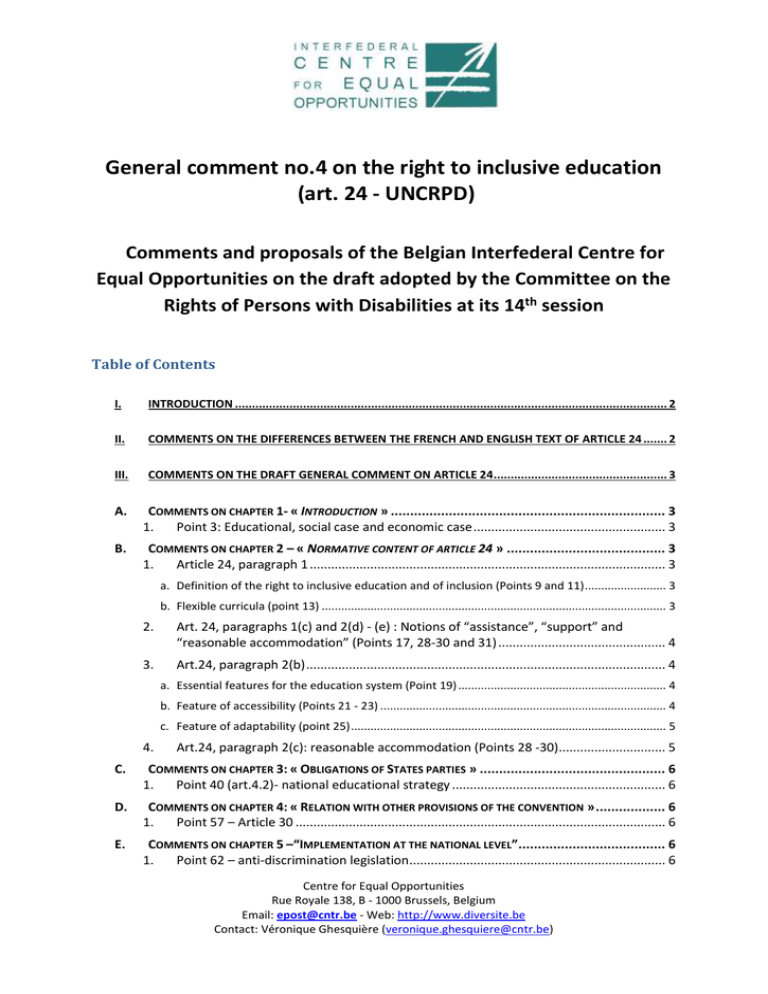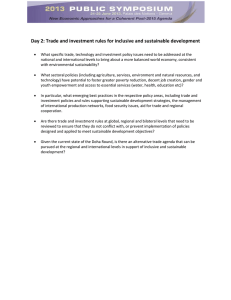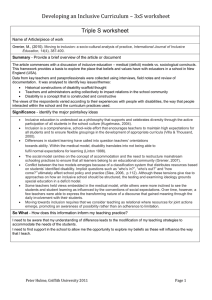General comment no.4 on the right to inclusive education
advertisement

General comment no.4 on the right to inclusive education (art. 24 - UNCRPD) Comments and proposals of the Belgian Interfederal Centre for Equal Opportunities on the draft adopted by the Committee on the Rights of Persons with Disabilities at its 14th session Table of Contents I. INTRODUCTION ............................................................................................................................... 2 II. COMMENTS ON THE DIFFERENCES BETWEEN THE FRENCH AND ENGLISH TEXT OF ARTICLE 24 ....... 2 III. COMMENTS ON THE DRAFT GENERAL COMMENT ON ARTICLE 24 ................................................... 3 A. COMMENTS ON CHAPTER 1- « INTRODUCTION » ....................................................................... 3 1. Point 3: Educational, social case and economic case ...................................................... 3 B. COMMENTS ON CHAPTER 2 – « NORMATIVE CONTENT OF ARTICLE 24 » ......................................... 3 1. Article 24, paragraph 1 .................................................................................................... 3 a. Definition of the right to inclusive education and of inclusion (Points 9 and 11) ......................... 3 b. Flexible curricula (point 13) .......................................................................................................... 3 2. Art. 24, paragraphs 1(c) and 2(d) - (e) : Notions of “assistance”, “support” and “reasonable accommodation” (Points 17, 28-30 and 31) ............................................... 4 3. Art.24, paragraph 2(b) ..................................................................................................... 4 a. Essential features for the education system (Point 19) ................................................................ 4 b. Feature of accessibility (Points 21 - 23) ........................................................................................ 4 c. Feature of adaptability (point 25) ................................................................................................. 5 4. Art.24, paragraph 2(c): reasonable accommodation (Points 28 -30).............................. 5 C. COMMENTS ON CHAPTER 3: « OBLIGATIONS OF STATES PARTIES » ................................................ 6 1. Point 40 (art.4.2)- national educational strategy ............................................................ 6 D. COMMENTS ON CHAPTER 4: « RELATION WITH OTHER PROVISIONS OF THE CONVENTION » .................. 6 1. Point 57 – Article 30 ........................................................................................................ 6 E. COMMENTS ON CHAPTER 5 –“IMPLEMENTATION AT THE NATIONAL LEVEL” ...................................... 6 1. Point 62 – anti-discrimination legislation ........................................................................ 6 Centre for Equal Opportunities Rue Royale 138, B - 1000 Brussels, Belgium Email: epost@cntr.be - Web: http://www.diversite.be Contact: Véronique Ghesquière (veronique.ghesquiere@cntr.be) I. Introduction A. Contents of the submission The Belgian Interfederal Centre for Equal Opportunities (referred to hereinafter as “the Centre”) is pleased to be able to contribute to the general comment on article 24 of the Convention on the Rights of Persons with Disabilities (referred to hereinafter as “CRPD”). In what follows, the Centre presents its views on the draft with a few suggestions. B. Centre for Equal Opportunities The Belgian Interfederal Centre for Equal Opportunities is an independent interfederal public service, specialising in equal opportunities policy and non-discrimination. The Centre is responsible for assisting victims of discrimination based on the protected grounds (one of which is disability) of the anti-discrimination laws which implement the European directives 2000/43 and 2000/78. As an independent mechanism, the Centre has also been responsible for promoting, protecting and monitoring the implementation of the CRPD in Belgium1 since 2011. II. Comments on the differences between the French and English text of article 24 The Centre would like to draw the Committee’s attention to some differences between the French and English text of article 24 affecting important concepts such as “inclusion”. Here are a few exemples: - - - 1 Art. 24, 1. : Where the English text provides that “States parties shall ensure an inclusive education system”, the French text refers to “insertion scolaire”. “Insertion” is a different concept than “inclusion”, it means rather “integration”. Art. 24, 2., b): Where the English text provides that “Persons with disabilities can access an inclusive, quality and free primary education and secondary education on an equal basis with others (…)”, the French text provides that “Les personnes handicapées puissent, sur la base de l’égalité avec les autres, avoir accès, (…), à un enseignement primaire inclusif, de qualité et gratuit, et à l’enseignement secondaire ». The French version may be interpreted in the sense that inclusive education is required only for primary education. Art. 24, 2., e) : Where the English version provides that “individualized support measures are provided (…) consistent with the goal of full inclusion ” the French text refers to “objectif de pleine intégration”. “Intégration” is a different concept than “inclusion”. Art. 33.2 CRPD 2 III. Comments on the draft general comment on article 24 A. Comments on chapter 1- « Introduction » 1. Point 3: Educational, social case and economic case By analogy with the information contained in the paragraph relating to the “educational case”, the Centre suggests that the information included in the paragraphs concerning the “social case” and the “economic case” should also be supported by scientific and academic sources. Furthermore, the point concerning the “economic case” would benefit from a more detailed explanation. B. Comments on chapter 2 – « Normative content of article 24 » 1. Article 24, paragraph 1 a. Definition of the right to inclusive education and of inclusion (Points 9 and 11) The Committee defines the right to inclusive education as “a process that transforms culture, policy and practice in all educational environments to accommodate the differing needs of individual students, together with a commitment to remove the barriers that impede that possibility”. Inclusion is defined as involving “a process embodying changes and modifications in content, approaches, structures and strategies in education, with a common vision that serves to include all students of the relevant age range”. According to the Centre, a distinction should be made between the right to inclusive education and the process to achieve the full realisation of this right. Showing the “process” does not define an inclusive system. The right to inclusive education must be defined as such, through its realisation in concrete, organisational, structural and educational terms. Consequently, it would be more appropriate to say that the right to inclusive education “requires” a process that “(…)” and to define it without referring to the method by which it can be achieved. b. Measures to address discrimination impeding access to education : flexible curricula (point 13) The general comment mentions that the measures needed to address all forms of direct and indirect discrimination impeding access to education include removing the barriers within educational institutions which prevent people with a disability from realizing their right to inclusive education on the basis of equality of opportunity. 3 As declared in point 12, inclusive education offers flexible curricula. According to the Centre, this is a key feature of inclusive education which is currently not sufficiently emphasised in the general comment (it is only briefly mentioned in points 12, 25 and 72). Currently, however, schools in Belgium regularly invoke the unreasonable nature of the adaptation of the curriculum in order to deny access to a pupil with a disability in mainstream education. The Centre therefore recommends the Committee to dedicate a paragraph to the importance of flexible curricula to achieve an inclusive education system. 2. Art. 24, paragraph 1(c) and paragraph 2(d) - (e) : Notions of “assistance”, “support” and “reasonable accommodation” (Points 17, 28-30 and 31) In point 17, the Committee refers to article 23 of the Convention on the Rights of the Child which provides that assistance must be extended to children with disabilities to ensure that they have “effective access to […] education […] in a manner conducive to achieving the fullest possible social integration and individual development”. The notion of ‘assistance’ appears in several articles of the CRPD but not in article 24. The Centre therefore believes it is necessary to further clarify this notion in the context of the right to inclusive education. In addition, the Centre invites the Committee to explain why such assistance should be free of charge at the primary level, but not at the other levels of education. Finally, the Centre notes that confusion may arise between the notion of ‘assistance’ on the one hand, and the notions of ‘support’ (clarified by the Committee in point 31) and ‘reasonable accomodation’ (clarified by the Committee in points 28-30) on the other hand. The Centre therefore invites the Committee to explicitly compare these three notions and the obligations they impose on States Parties. 3. Art.24, paragraph 2(b) a. Essential features for the education system (Point 19) The draft mentions that the “education system must comprise four interrelated and essential features”. The Centre notes however that the general comment subsequently enumerates five features : availability (20), accessibility (21), acceptability (24), adaptability (25) and quality (26). b. Feature of accessibility (Points 21 - 23) The Centre notes that the examples provided in paragraph 21 do not include medical care at school. In the Centre’s opinion, however, this is an essential feature of a school accessible for all children including those who need medical care during school hours. 4 The Centre shares the position of the Committee regarding the accessibility criteria. However, owing to the lack of a fully inclusive system, pupils still have to take specific steps to access the measures allowing them to participate in mainstream education. The Centre suggests that the general comment should specify that, in such cases, the students concerned must be clearly informed of the steps to take and that they can be taken at no extra cost and as quickly as possible. c. Feature of adaptability (point 25) Firstly, regarding Universal Design for Learning (UDL), the Centre would like to emphasize that the responsibility for introducing the UDL approach not only rests with the individual teachers. This approach must be shared and encouraged by all the stakeholders in education. It involves a collaborative effort between departments, teachers and educational teams. Secondly, regarding standardisation, the Centre shares the view of the Committee on the importance of moving away “from reliance on standardised assessment and testing, towards recognition of individual progress towards broad goals (…)”. In this respect, the Centre would like to draw the Committee’s attention to the ongoing process of harmonisation of European higher education degree systems (the ‘Bologna process’). It must be ensured that this process does not create barriers for students with disabilities. The degree structures must leave sufficient flexibility so that curricula and assessment methods can be adapted to meet the needs of these students. 4. Art.24, paragraph 2(c): reasonable accommodation (Points 28 -30) The general comment clarifies that “reasonableness” is to be understood as the result of an objective test which balances the availability of resources, the relevance of the accommodation and the expected goal of countering discrimination. Since these are broad criteria, the Centre is concerned that it is not sufficiently clear which requirements must be fulfilled for a test to be objective. The Centre therefore suggests that the Committee provides further guidance on when a test can be considered as objective. Regarding the statement in point 28 that “the extent to which reasonable accommodation is provided must be considered in light of the State party’s overall obligation to develop an inclusive education system”, the Centre is concerned that this sentence may create confusion as it could be interpreted to mean that the immediate obligation of providing reasonable accomodation is conditional upon the progressive realisation of an inclusive education system. The Centre is convinced that schools should not be given the opportunity to invoke the state’s lack of action in order to deny reasonable accomodation to a student in a concrete case. For the same reason, the Centre would suggest to move the last sentence of point 28 (“It is not acceptable, for example, that States parties evade taking any steps to develop an inclusive education system, using the lack of resources and high cost as justification) to points 39 - 40 where the obligations of State parties are further explained. This would ensure a clear distinction between the immediate obligation to provide reasonable accommodation 5 on the one hand and the obligation to progressively realise an inclusive education system on the other hand. Regarding point 29, the Centre would welcome additional examples of immaterial reasonable accommodations such as replacing an element of the curriculum by an equivalent element, allowing a student to take more time for a test, or alternative evaluation methods. Regarding point 30, the Centre would suggest to specify that the mechanisms for redress should not only be safe and accessible but also effective. C. Comments on chapter 3: « Obligations of States parties » 1. Point 40 (art.4.2)- national educational strategy Regarding the national educational strategy, the Centre suggests that the Committee specify which elements such a strategy should include as a minimum. D. Comments on chapter 4: « Relation with other provisions of the convention » 1. Point 57 – Article 30 The Centre welcomes the Committee’s clarifications of the relation between article 24 and article 30 in the sense that it clarifies that activities such as study trips are an integral part of an inclusive school. They are an essential contribution to a child’s full inclusion in a school and the wider society. The Centre’s experience shows that disputes about reasonable accommodation often arise when such activities are organised. The Centre therefore suggests that the Committee explicitely state that the obligation to provide reasonable accommodation also applies to these activities. E. Comments on chapter 5 –“Implementation at the national level” 1. Point 62 – anti-discrimination legislation The Center believes it is important to highlight in this paragraph that the national antidiscrimination legislation must incorporate the notion of disability as described in the Convention and should not limit the protection of the legislation to persons falling under a more strict interpretation of “disability”e.g. based on the medical model of disability. * * * 6




